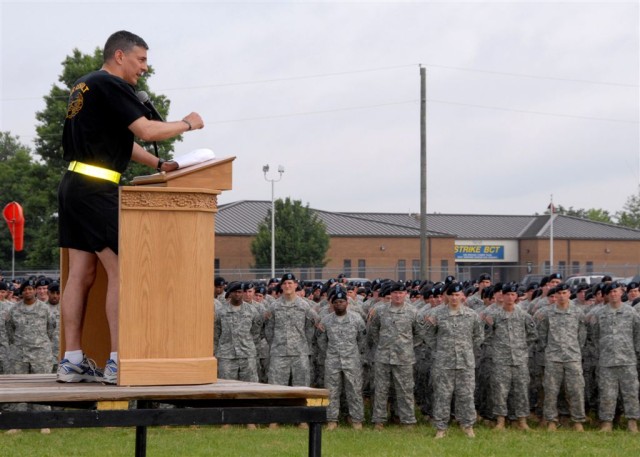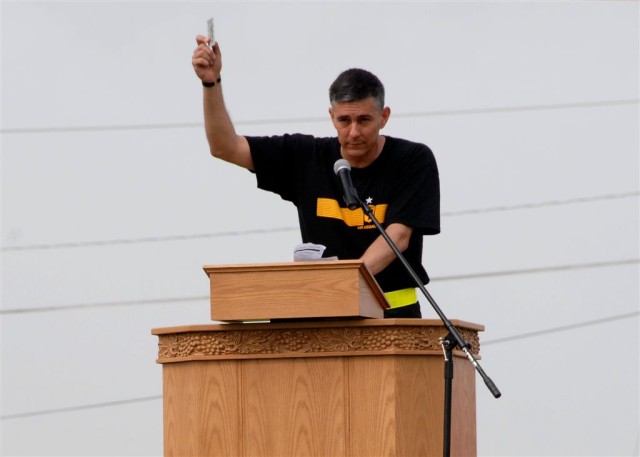Deputy Commander Brig. Gen. Stephen Townsend made a personal appeal on the pressing issue of suicide to nearly the entire division Wednesday.
"No matter how bad problems seem, trust me, it is not the end of the world," Townsend told the massive array of troops. "It will be better tomorrow. Don't take away your tomorrow."
The rare formation, usually reserved for top-level changes of command, was intended to respond aggressively to a recent rise in suicides among Fort Campbell Soldiers. Within the past two weeks, three 101st Airborne Division Soldiers have died from self-inflicted wounds.
Fort Campbell's 14 Soldier deaths in 2009 have either been confirmed or are being investigated as possible suicides, leading the Army.
Division units were summoned to one of three formation sites: Fryar Stadium, Destiny Field and Johnson Field. Townsend traveled to each site in succession, speaking to the Soldiers there for 10 minutes.
The speech emphasized the far-reaching consequences of a single suicide.
When a Soldier takes his own life, he not only injures himself, but also devastates his family, abandons his band of brothers, discredits his division and weakens the national defense, Townsend said.
"[Suicide] is not the reputation of the legendary Screaming Eagles," Townsend said.
It was the 101st Airborne's refusal to quit against incredible odds that has distinguished the division throughout history, he added.
Because the nation relies on the military to keep it safe from enemies, he said, one Soldier's suicide is a let down to all Americans.
Townsend urged Soldiers to be on the lookout for the few in each of their units who show signs of suicide.
Common signs are sudden withdrawal from the unit's social life and making comments about self harm.
The recent suicides disturbed Townsend, his command staff and garrison leaders especially, because the installation had already waged an extensive prevention campaign. Soldiers learned the prevention principles such as, "Ask, Care and Escort" through the chain of command sessions.
In March, Fort Campbell observed an Armywide stand down with screenings of the suicide prevention films, "Beyond the Front" and "Shoulder to Shoulder."
In 2007, Soldiers were also given an Eagle Warrior Ethos card with contact information for their first line supervisor, battle buddy and crisis counseling agencies. The card was the beginning of the suicide prevention campaign initiated by Maj. Gen. Jeffrey Schloesser, Fort Campbell and 101st Airborne Division commanding general.
Following the campaign, Fort Campbell went nearly six weeks without a suicide. But when tragedy struck again, Townsend decided to try a more direct approach.
"The way for them to understand how serious this is to the whole post is to hear it from me," Townsend said.
Standing on a flatbed trailer in his PT uniform, the general encouraged Soldiers battling suicidal thoughts to turn to their leadership.
"From corporal to command sergeant major to colonel and even to brigadier general, we're here to help you," Townsend said.
Soldiers can seek counseling at the hospitals and clinics anonymously.
Warrant Officer John Nikolao heard Townsend's speech with units from the 101st and 159th combat aviation brigades. The stand down made the magnitude of the suicide problem clear, Nikolao said.
"[Suicide] doesn't just affect Soldiers and those around them," Nikolao said. "It hurts the Army as a whole."
Both Nikolao and his buddy, Warrant Officer Joseph Callaway, agreed that detecting a Soldier in a suicidal crisis can be difficult.
Callaway was reminded of a Soldier in his unit who took his life several years ago.
"Even those who knew him didn't see it coming," Callaway said. "Suicide is a difficult thing to forecast."
Nikolao said the best solution is vigilance among commanders and peers as well as personal attention.
"Normally things like that can be handled by grabbing a Soldier and saying, 'What are you doing this weekend or tonight'' and then hanging out with them," Nikolao said. "That's what it takes."
Townsend wanted to spend focused time with the Soldiers, free from the competing routines of unit life.
This was an opportunity for leaders and Soldiers to focus on decreasing the rate of suicides and suicidal behavior without interference, he said.
Townsend plans to continue meeting with small groups of Soldiers to keep suicide prevention as a top priority.
Deadlines for mandatory awareness trainings have been accelerated. Units must have 100 percent of their Soldiers in compliance with Phase I training by Friday. Phase II training must be completed no later than June 9.




Social Sharing